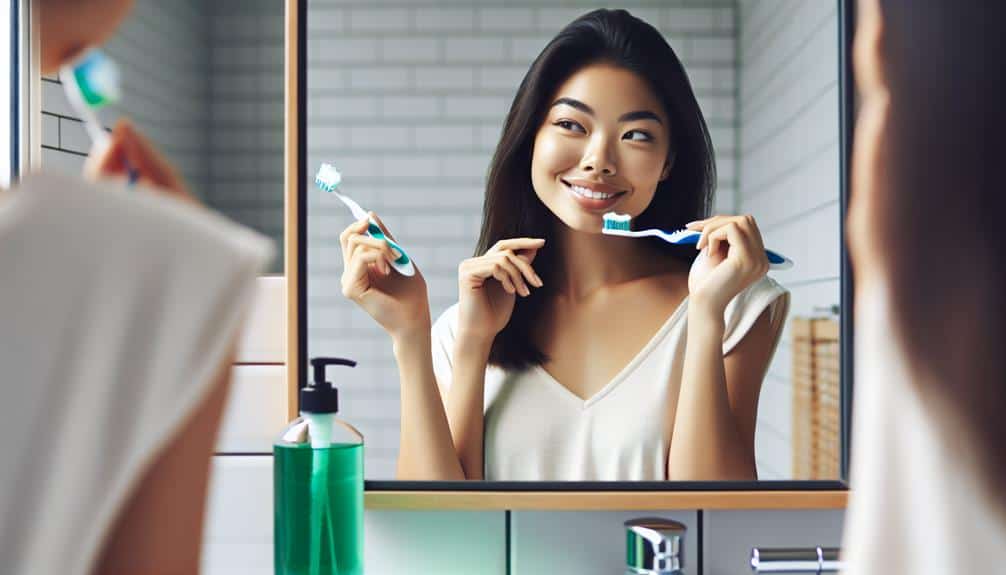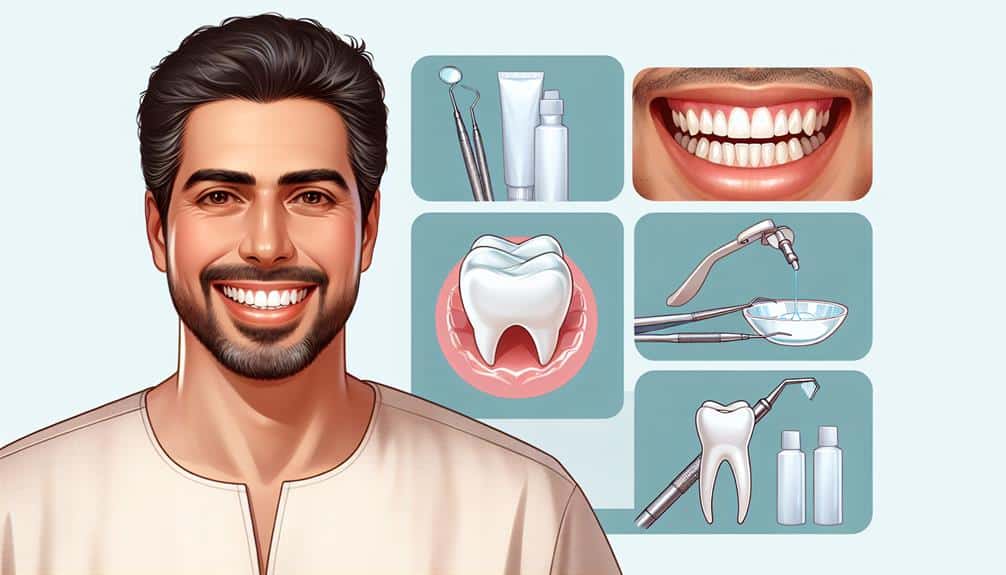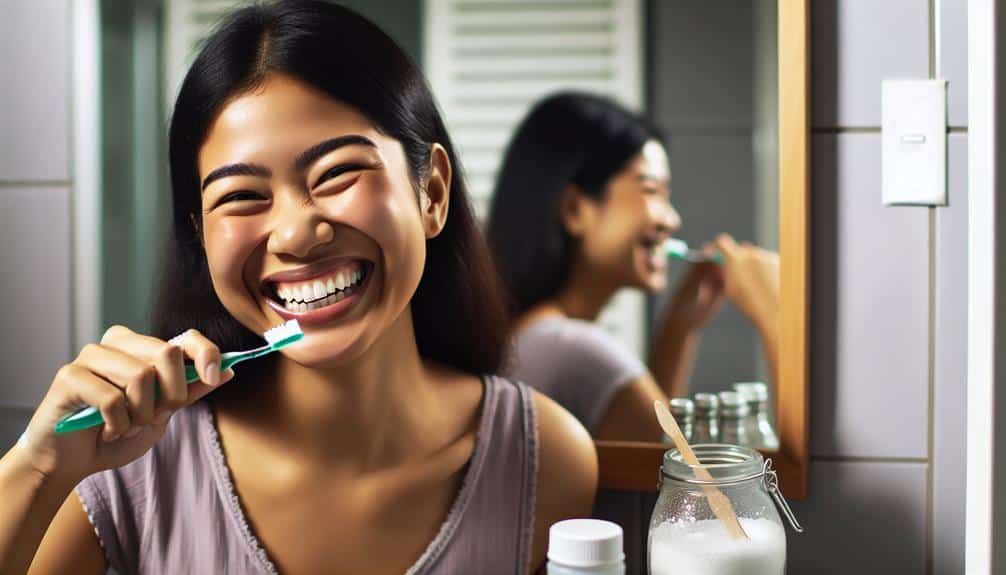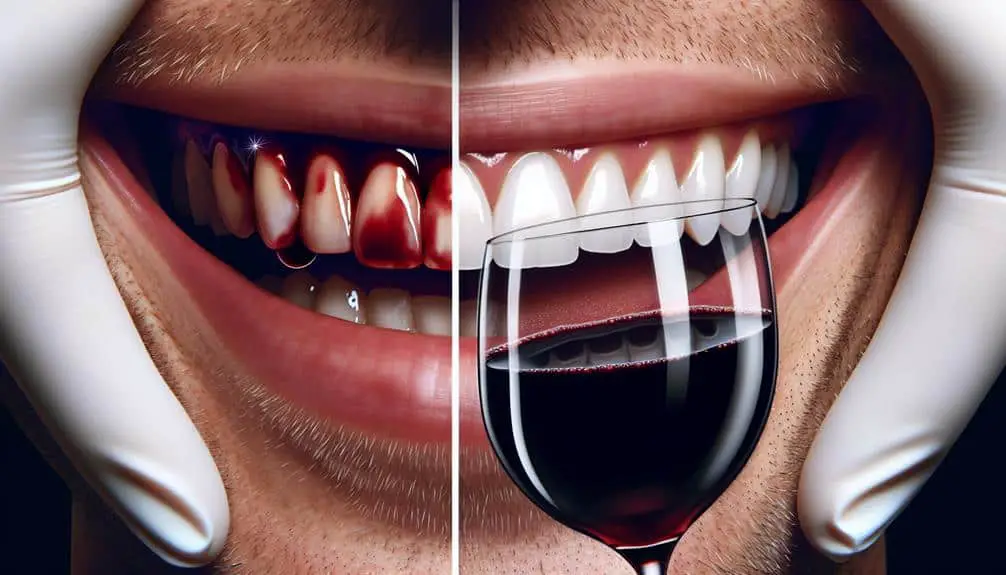Maintain your lifestyle-stained teeth by brushing gently for two minutes twice daily with a soft-bristled toothbrush. Watch your intake of staining beverages, rinse with water, and consider healthier options. Visit your dentist biannually for cleanings and personalized care. Use whitening toothpaste with enamel protection and consider your oral health needs. Steer clear of tobacco and teeth-staining foods, opting for whitening procedures if needed. For more detailed expert advice on maintaining your bright smile, keep exploring your journey to healthier teeth.
Key Points
- Brush teeth thoroughly twice daily with a soft-bristled toothbrush and gentle circular motions.
- Reduce intake of staining beverages and rinse mouth with water after consumption.
- Schedule biannual dental check-ups for professional cleanings and personalized oral care recommendations.
- Use whitening toothpaste with enamel protection and sensitivity prevention features.
- Avoid tobacco, staining foods, and opt for whitening procedures if stains persist.
Proper Brushing Techniques
To maintain a bright smile and prevent lifestyle-stained teeth, make sure you're using proper brushing techniques consistently. Brushing your teeth at least twice a day for two minutes each time is important. Confirm you're using a soft-bristled toothbrush to avoid damaging your enamel and gums. When brushing, use gentle circular motions and make sure to reach all surfaces of your teeth, including the hard-to-reach areas at the back of your mouth.
In addition to brushing, incorporating flossing into your daily oral hygiene routine is vital for preventing stains caused by plaque buildup between teeth. Flossing helps remove food particles and plaque that can lead to discoloration and decay. Remember to be gentle while flossing to avoid injuring your gums.
Using mouthwash can also provide benefits in maintaining a bright smile. Mouthwash can help reduce bacteria in your mouth, freshen your breath, and reach areas that may be difficult to clean with a toothbrush. Look for a mouthwash that's alcohol-free to avoid drying out your mouth and causing further staining. Incorporating these flossing tips and mouthwash benefits into your oral care routine can help you achieve and maintain a healthier, brighter smile.
Limit Staining Beverages
Consider limiting your consumption of staining beverages to help maintain a brighter, healthier smile. Dietary modifications play an important role in preventing teeth staining. Beverages like coffee, tea, red wine, and colas contain chromogens that can adhere to tooth enamel, leading to discoloration over time. By reducing your intake of these beverages or using a straw to bypass direct contact with your teeth, you can minimize the risk of staining.
Preventive measures such as rinsing your mouth with water after consuming staining beverages can also help reduce their impact on your teeth. Additionally, incorporating more water and milk into your daily beverage choices can dilute the staining effects of darker drinks. Being mindful of the frequency and quantity of staining beverages you consume can greatly contribute to maintaining a whiter smile.
Regular Dental Check-ups
Regular dental check-ups are essential for maintaining peak oral health and preventing potential issues before they escalate. These routine visits play an important role in the overall well-being of your teeth and gums. During these appointments, your dentist not only examines your mouth for any signs of decay or gum disease but also provides professional cleanings that remove plaque and tartar buildup that can't be addressed through regular brushing and flossing alone.
Importance of cleanings can't be overstated as they help prevent gum disease and cavities, ensuring your smile stays bright and healthy. Additionally, dental check-ups allow your dentist to assess your dental hygiene habits, providing personalized recommendations to improve your at-home care routine. By addressing any concerns early on, you can avoid more extensive and costly treatments in the future.
Make sure to schedule regular dental check-ups at least twice a year to maintain the best oral health and keep your lifestyle-stained teeth in check. Your diligence in attending these appointments will go a long way in preserving your radiant smile.
Use Whitening Toothpaste
Maintaining your oral health through regular dental check-ups can be complemented by incorporating whitening toothpaste into your daily oral care routine. Whitening toothpaste not only helps in removing surface stains caused by coffee, tea, or smoking but also provides additional benefits. Look for toothpaste that offers enamel protection, as some whitening products can be abrasive and wear down the enamel over time. Enamel protection is essential for maintaining strong and healthy teeth in the long run.
In addition to whitening effects, certain toothpaste formulas are designed for sensitivity prevention. If you experience tooth sensitivity, choosing a whitening toothpaste with added ingredients to address this issue can help alleviate discomfort while still effectively brightening your smile. Sensitivity prevention is particularly important for those with enamel wear or gum recession, as these conditions can lead to increased tooth sensitivity. When selecting a whitening toothpaste, consider your specific oral health needs to achieve the best results.
Avoid Tobacco and Staining Foods
To prevent staining on your teeth, it's important to stay away from tobacco products and foods known to cause discoloration. Tobacco products contain tar and nicotine, which can lead to yellow or brown stains on your teeth over time. Additionally, foods and beverages such as coffee, tea, red wine, and berries can also contribute to teeth discoloration.
Making lifestyle changes can greatly help in maintaining the whiteness of your teeth. Avoiding tobacco products altogether is the most effective way to prevent teeth staining. Similarly, reducing the consumption of staining foods and beverages can also make a noticeable difference. Opting for teeth whitening procedures can further enhance the brightness of your smile, especially if stains have already set in.
Frequently Asked Questions
Are There Any Natural Remedies or DIY Methods That Can Help Reduce Stains on Teeth?
Looking to brighten your smile naturally? Try herbal remedies and DIY methods to tackle teeth stains. Explore natural solutions and home remedies that may help reduce discoloration, giving you a confident smile.
How Often Should I Replace My Toothbrush to Effectively Prevent Staining?
To effectively prevent staining and maintain oral health, it's recommended to replace your toothbrush every 3-4 months. Proper technique, such as gentle brushing and reaching all areas, plays an essential role in preventing discoloration.
Can Certain Medications or Health Conditions Contribute to Teeth Staining?
Certain medications and health conditions can indeed contribute to teeth staining. Medications like tetracycline and conditions like enamel hypoplasia can discolor your teeth. Lifestyle factors, such as smoking and consuming staining foods, can also play a role.
Is It Possible to Over-Whiten Teeth With Whitening Toothpaste and What Are the Potential Risks?
You can definitely over-whiten your teeth with whitening toothpaste. Excessive use can lead to tooth sensitivity and enamel damage. It's essential to follow the instructions carefully to avoid potential risks and maintain a healthy smile.
Are There Any Specific Mouthwashes or Oral Care Products That Can Help Maintain White Teeth?
To maintain white teeth, consider mouthwash benefits like fresh breath and cavity prevention. However, mouthwash has limitations in whitening. Oral care products vary in effectiveness, so compare options for best results. Consult your dentist for personalized recommendations.



